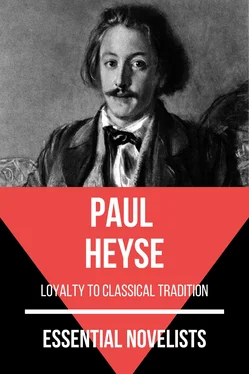He knew also that Balder was rarely alone at these times, Mohr came almost every evening to chat, to play chess with him, or to sit at the open window and listen to Christiane's piano. He declared that this music and Balder's golden mane were the only domestic medicines that afforded him any relief, when he had a particularly violent attack of his chronic self-contempt. He often brought some of his verses with him or a scene of his famous comedy: "I am I, and rely on myself," to get the youth's opinion, but could never make up his mind to read them aloud. Now and then Franzelius also appeared, but soon went away again if he met Mohr. To be sure the latter, at Balder's request, made the most earnest efforts to curb his mocking tongue and to spare the fiery tribune of the people, who was so helpless when in a small company. But his mere presence annoyed the irritable fellow, especially as he imagined that since Mohr's return some secret barrier had arisen between himself and Balder. He loved the youth more than any other human being, and knew that no one understood him better. Now he was jealous of every smile that Mohr's quaint manner won from his darling, and in his stupidity and dullness, felt doubly at a disadvantage in the presence of the cynical jester, who nevertheless was an object of scorn to him, as a drone among the working bees.
Balder, with his delicate sensibility, would probably have been even more careful than usual to soothe his wounded friend; but he was very anxious, and his thoughts, even while the two young men were with him, secretly followed his brother along the unknown paths, of which he had such a superficial knowledge. Not that Edwin would have concealed where he went, and that he was daily becoming more and more ensnared by the magic of this singular relation, but he could not reconcile his mind to confess the full extent of his weakness, for in so doing he would have been obliged to have acknowledged it to himself, and against such an acknowledgement all the pride and manliness in his nature struggled.
How contemptible he appeared to himself when at night, after he had wandered about, long and aimlessly, he again turned his steps toward the house in Jägerstrasse, instead of going home, to stand on the opposite side of the street pressed against the wall in some dark corner, until her carriage brought her back from the theatre, and then to wait hour after hour at his post, to see whether the door would not open again and allow some more fortunate person admittance or egress, until the light behind her curtain vanished, and every thing around him was hushed to repose in the coolness of the autumnal night, except the fever in his blood. How he cursed the hour which had first brought him to her presence, and made the firmest resolutions to put an end to this madness and never cross that fatal threshold again!
But the next, day would find him once more at the little table, envying the birds that pecked their food in happy ignorance and in freedom from suffering like his.
The young girl herself seemed to have no suspicion of how little prudence her "wise friend" possessed. She treated him on the tenth day exactly as she had done on the first, with the same frank cordiality, the same careless confidence; as if it were impossible he could ever become more distant or approach her nearer. When he came and went, she gave him her hand like an old friend, scolded him if he kept her waiting, questioned him, after she had once discovered that his nerves were disordered, most sympathizingly about his health, and urged him to use all sorts of remedies and medicines, of which she had read or heard. More than once she acknowledged that she did not understand how she had ever got through the long days before making his acquaintance, and only dreaded the moment when he would grow weary of wasting his time on such a foolish, ignorant girl, though to be sure the tone in which she had expressed this fear was not very grave. But though she must have been perfectly aware of her own powers of attraction, the idea that any deeper feeling might bind him to her never seemed to enter her head. The longer he watched her, the more he became convinced that in speaking of love as she had, she had given utterance to her real opinions. It actually appeared to her like a sort of madness, by which weak minds were sometimes attacked. How a sensible man, who came to see her every third day, brought her solid books and said very clever things, could be seized by it, would evidently have been incomprehensible to her.
He perceived all this, recognized the hopelessness of his concealed longing, the improbability of ever thawing the ice that surrounded her like a protecting wall. He had once asked what there was about him to inspire her, usually so reserved to every one, with so much confidence in him. She laughed, and shaking her head declared that that was a secret she intended to keep to herself, and when, contrary to his usual custom, he pressed her for an answer, she confessed that neither his honest face, nor anything he had said, had given her the assurance that he would not abuse her confidence, but—and here she looked at him with a bewitchingly droll, half timid, half doubtful smile on her face, as if wondering whether he would take it amiss—the fact that he wore no gloves, and did not pay any more attention to his dress when he made the second visit, than when he first called to return her the bookmark.
He laughed, but was obliged to exert considerable self control, to treat as a jest a matter that was far from being one to him.
He distinctly perceived that she only preferred him because, as a being belonging to a totally different sphere, she thought him perfectly harmless. In the seclusion of her life, a visitor who, like him, brought her amusement without making any special claims, was very welcome, and the fact that he meantime remained as much a stranger to her, as she to him, only increased the charm of this intercourse. Besides, a man who always visited her in the same grey summer suit and without gloves, was safe from the least suspicion of desiring any closer relation.
There were moments when he could not help being grateful to her honesty, for not leaving him in doubt about the impassable gulf between her worldly desires and needs and his own, when he suddenly shrank from the mere thought that she could ever return his passion, as if such a return would be a terrible misfortune. Aside from all the mystery that surrounded her, how could he ever hope to harmonize his fate and Balder's, their cheerfully endured poverty, his duties to his profession, with the life she led, and which alone could be satisfactory to her, since she expressed no wish to change it. He only needed to imagine her in the place of Reginchen, who brought them their dinner, and to transport to the "tun" the form of his enchantress, with the striped waistcoat and his silver dish behind her, to measure the abyss of impossibility that yearned between them.
Thus weeks elapsed, without any change, either for the better or worse, having taken place in their intercourse. To be sure he did not always find her in the same mood; oftentimes he even thought he perceived that she had been weeping, or she greeted him with a look of surprise, as if it were difficult for her to recall her thoughts from some distant scene to him and what he brought. But a few words from Edwin were sufficient to clear her brow and transform her once more into the frank, friendly child that, with all her pampering and the strange independence of her life, she really was. She fairly provoked him to sometimes catch her in a piece of carelessness or failure in etiquette, and then he treated her with condescending, sarcastic composure, as if she were a person not fully accountable for her actions. But he carefully avoided letting her feel his superiority in any other than a jesting manner. If, as she was fond of doing, she roved in fancy, with strange transitions of thought, over the world and mankind, life and death, time and eternity, he could sit for fifteen minutes, tattooing an apple in fantastic designs with a silver fruit knife, and listening in silence. It always vexed her that he did not seem to think it worth while to contradict her, and declared that even if he laughed aloud and derided her, it would be less impolite than to sit silently smiling, while she was talking about the most serious matters. If the wind were blowing, or a fountain plashing, he could not adopt a more indifferent air—"Was it his fault?" he answered laughing, "that in her presence he often felt as strange an emotion as in that of nature, whose manifold voices frequently rippled over him with similar elementary power, without his feeling called upon to make any reply? He would seem to himself a ridiculous pedant if he tried to talk logic to the woodland birds, and reason to the waterfalls."
Читать дальше












